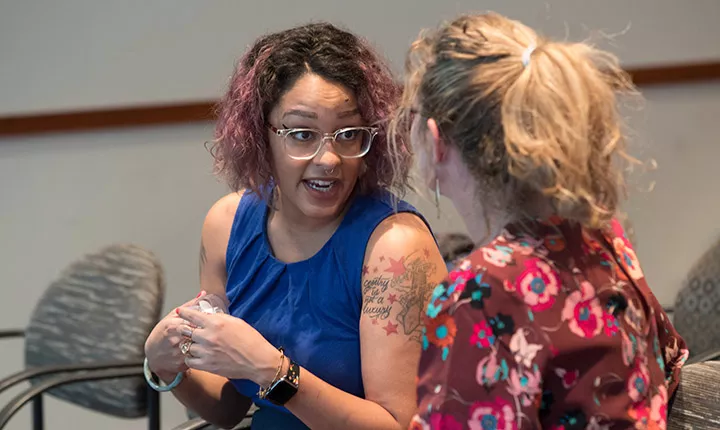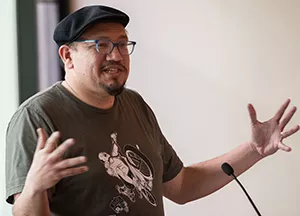Sociologist Eve Ewing Brings "Poetry in Context: An Encuentro" to Swarthmore

Ewing, whose collection of poems focuses on intersectionality and social justice, asked: "How are the options we are given prescribed by the assumptions we are making?”
This week, Eve L. Ewing, a writer and sociologist of education at the University of Chicago, visited Swarthmore to discuss her most recent book, Electric Arches (Haymarket Press, 2017), a collection of poems focused on intersectionality and social justice. Ewing introduced and read seven of her poems before taking questions from the audience.
“I consider myself a public sociologist,” Ewing began, noting that one of the ways she engages her research and academic work with the public is through poetry. The purpose of academia, Ewing added, “is to talk to communities and be accountable to communities outside of itself.”
The event was supported by an Andrew W. Mellon Foundation grant from the President's Office. The proposal, which was submitted by Meghan Kelly '18, a special major in education and sociology & anthropology from Wolcott, Conn., and Assistant Professor of Educational Studies Edwin Mayorga, planned for a dialogue with Ewing through an encuentro, a Spanish term referring to both the act of meeting and the act of finding.
The seven poems Ewing chose stem from her work as a sociologist. She opened with a piece entitled “Horror Movie Pitch,” which speculates about what would happen if all the black women in the world suddenly turned invisible. Maybe they would just leave, Ewing mused, or “maybe they would do everything you did to them.” Next, Ewing read “Horror Movie Pitch 2,” a follow-up that imagines all work done by men bleeding and catching on fire.

Assistant Professor of Educational Studies Edwin Mayorga helped bring Dr. Ewing to campus for the encuentro.
The next four poems Ewing shared discuss specific historical events. “I Saw Emmett Till This Week at the Grocery Store” imagines the sort of ordinary life Emmett Till might have had if he had not been killed for the color of his skin. “July, July” reflects on a heat wave in Chicago that killed primarily people of color, presenting environmental justice as an intersectional issue. “One Good Time for Marilyn Mosby” considers the story of the judge who brought charges against the police officers implicated in the death of Freddie Gray. “Jump Rope,” which Ewing performed by singing in a variety of styles, follows a black boy who drowned after a riot broke out near a segregated swimming pool.
The last poem Ewing read, entitled “Arrival Day,” extrapolates from a line from Assata Shakur: “Black revolutionaries do not drop from the moon. We are created by our conditions.” Ewing, an Afrofuturist, asked, “What if they did?” and imagines the coming of the “moon people.”
Following her reading, Ewing took questions from the audience. She discussed her entrance into poetry, her focus on liberation, her depiction of Chicago, and her Twitter presence. In response to a question about how to counter traditional narratives of power, Ewing described the discussion surrounding free speech and diversity as having created a false dichotomy similar to puppies versus ice cream: the two are not actually comparable or mutually exclusive. As Ewing explained, she refuses to enter the debate; instead, she asks, “How are the options we are given prescribed by the assumptions we are making?”
Ewing followed her talk at Swarthmore with an evening reading at Amalgam Comics in Philadelphia.
Ewing spoke on campus as one of the performances, movie screenings, and lectures held in honor of Black History Month. The final event takes place today at 4:30 p.m. in the Scheuer Room with the discussion "Direct Action and Affirming Queerness in the Black Community."



